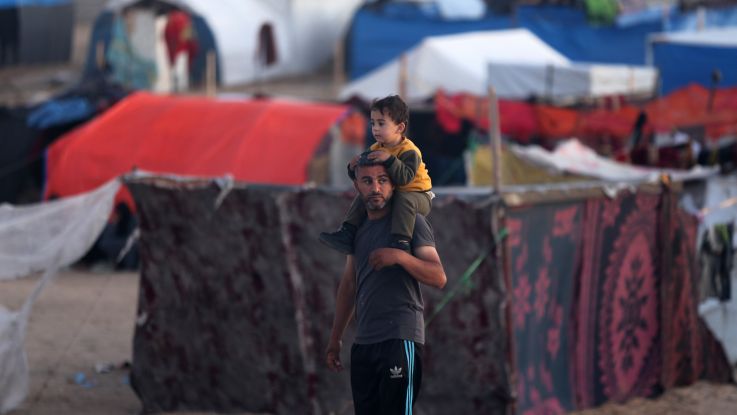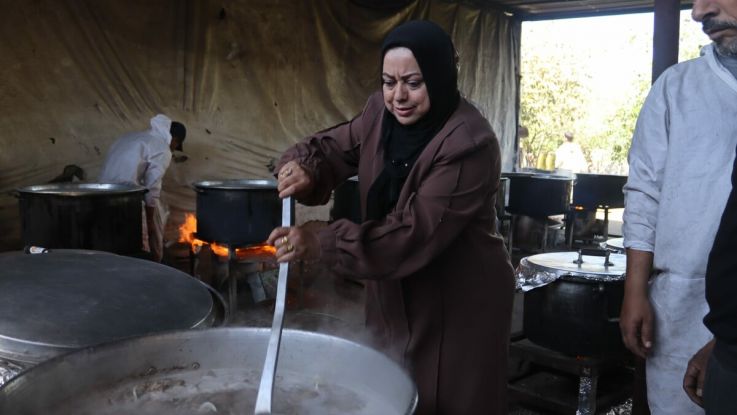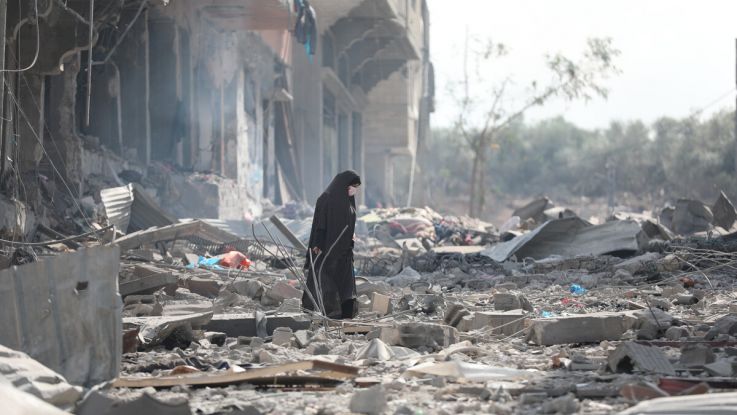Gaza risks falling into famine with the whole population now in food crisis
16 January 2024
With only a trickle of humanitarian aid entering Gaza, people are experiencing catastrophic levels of food shortages, with as many as 40% of the population facing famine, according to UNRWA.
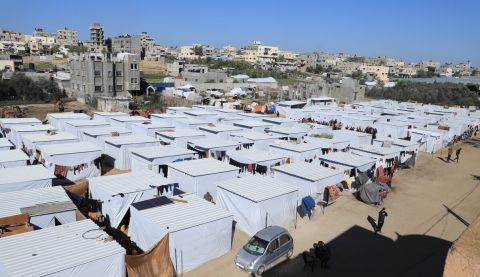
Camps set up for displaced people in Rafah. ActionAid Palestine. Photo: ActionAid Palestine
"We are living in a situation that we cannot call humane," says Abdul, a youth volunteer in Gaza. "There is no health, no food, and there are no basic necessities of life."
The people of Gaza have now endured three months of attack by intense bombing and an ongoing land offensive, and the humanitarian situation there is beyond catastrophic.
Aid coming in to Gaza has been limited because of the siege imposed by Israel.
Households are skipping meals every day - people are going entire days and nights without eating.
Around 40% of the population is at risk of famine, according to UNRWA, the United Nations Relief and Works Agency for Palestine Refugees.1
The Integrated Food Security Phase Classification (IPC) scale for acute food insecurity now classes Gaza’s entire population as facing ‘crisis’ levels of hunger, while half the population is facing ‘emergency’ levels and one in four households face ‘catastrophic conditions’,2 the highest proportion of a population with acute food insecurity they have ever recorded.
The question of aid in Gaza
Nearly one million people displaced to Rafah - an area located in southern Gaza on the border with Egypt - are facing overwhelming challenges in accessing essential aid.
Abdul, who volunteers with ActionAid Palestine's partners, highlights the harsh reality of their living conditions.
If you want to buy anything, like food in the morning, noon, or night, it must be one meal. You collect it in the middle of the day, this meal costs at least 50 shekels [£10.58].
When we previously said that the situation was difficult, we used to say [that] we will eat fried vegetables. But today vegetables and tinned food are very expensive."
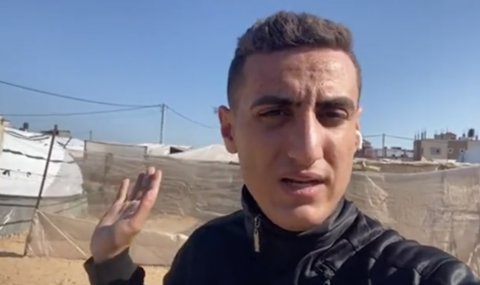
Abdul is a youth volunteer with ActionAid Palestine's partner organisation.
The level of aid currently able to enter Gaza is limited and woefully insufficient to meet needs.
Since the end of the humanitarian pause in early December, around 100 trucks of aid have entered Gaza each day – well below the average of 500 trucks of humanitarian aid and other supplies which entered Gaza each day before 7 October.
Since mid-December very limited aid has been permitted to enter Gaza via the Kerem Shalom crossing, in addition to the Rafah crossing, however the amount entering is just a drop in the ocean compared to the staggering level of need.
Human Rights Watch has said that the Israeli government is using starvation of civilians as a weapon of war, which is a war crime.3
Airstrikes have damaged food warehouses across the Gaza Strip, while the majority of bakeries have either been bombed or have shut down due to a lack of fuel. Shops are increasingly closing their doors, and even those that remain open are running out of essentials such as wheat flour, dairy products, water and eggs.
It is also very difficult to transport the little food aid entering the territory to those who need it.
Delivering the limited aid that enters Gaza is extremely challenging and dangerous due to frequent communications blackouts, damaged infrastructure, including roads and vehicles; limited fuel supplies; and the danger posed by airstrikes.
Without a ceasefire, aid cannot be delivered safely and at the scale needed to save lives.
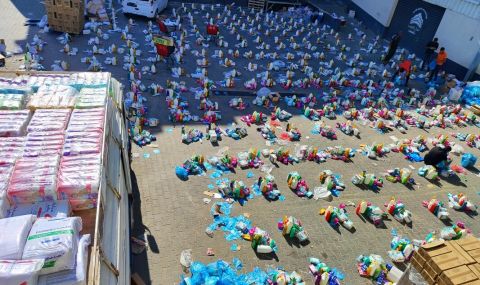
ActionAid partner, Wefaq Association preparing aid supplies.
Food scarcity and rising prices
As aid supplies run out and food has become scarcer, prices are rising.
Basma*, who has been displaced from her home in northern Gaza, says that although some aid has reached her family, she feels it is nowhere near enough to meet their needs.
I hope to make my children happy and buy them anything to satisfy their hunger. My smaller son [is] asking me for biscuits but the prices are very high.If my children survive from death from the continuous bombing, terror and fear, they will die of hunger. Where is the world?"
Inaya*, who is staying in a camp in southern Gaza with her family, told us what they have to survive on day to day:
For eight people, we are given three boxes of cheese with a couple of fava bean cans to last us for breakfast, lunch, and dinner.”
Where food is available, people are having to queue for hours in the hope of receiving food aid for their families, but either return empty-handed or with barely enough to keep them alive. Abdul tells us:
There are queues. Queues for fresh water, queues for salt water, queues for food, and queues for drink, everything has a queue."
Yara* is a mother and humanitarian worker who was displaced from northern Gaza and is now sheltering in the south.
We [can] no longer find bread and we stay in bread lines for six, seven, or eight hours so we can get bread to feed the children.”
Even when people do have a small amount of food, without fuel, there is no way to cook it. As a result, people are resorting to eating raw onions and aubergines, or making fires using unsafe and unhealthy methods.
What is ActionAid doing to help?
ActionAid has worked in the occupied Palestinian territory since 2007. We work hand in hand with our Palestinian partners throughout the Gaza Strip to provide humanitarian aid and to respond to emergencies: our local partners are based in their communities so we know that aid is reaching those who need it most.
Despite the huge challenges, ActionAid and its partners such as Wefaq Association for Women and Childcare (WEFAQ) have been supporting people in Rafah by providing food, hygiene kits and ‘winter kits’ containing warm clothes, blankets and mattresses, as well as providing families with cash assistance so they can buy essential items.
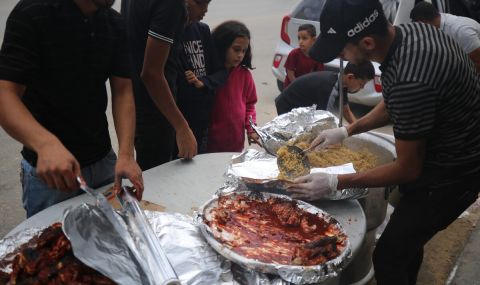
Food is collectively cooked and distributed on the streets of Deir A-Balah.
But it's important to recognise that this is a protracted crisis.
While our initial focus is on providing immediate assistance, we're also committed to the long-term process of helping people rebuild their lives and cope with the trauma they've experienced.
How you can help
The amount of relief supplies we are able to supply - once we can deliver aid safely - will largely depend on the amount of funds we’re able to raise.
We are urgently seeking donations, so we can respond to immediate needs and as well as to plan effectively with our partners for the phases to follow.
We’re asking for your support now.
Footnotes
- 1https://www.theguardian.com/world/live/2023/dec/30/israel-gaza-war-live-hamas-palestinians-khan-younis-deaths-un-aid-us?filterKeyEvents=false&page=with:block-659057a48f083c8fda16c2a6#:~:text=2023%2011.21%20EST-,UNRWA%3A%2040%25%20of%20Gaza's%20population%20at%20risk%20of%20famine,is%20grappling%20with%20catastrophic%20hunger.
- 2https://reliefweb.int/report/occupied-palestinian-territory/gaza-strip-ipc-acute-food-insecurity-november-2023-february-2024-december-21-2023#:~:text=Among%20these%2C%20over%2040%25%20of,above%20(Crisis%20or%20worse).
- 3https://www.hrw.org/news/2024/01/10/world-court-hear-genocide-case-against-israel#:~:text=Israeli%20authorities%20are%20also%20using,could%20be%20delivered%20within%20weeks.

